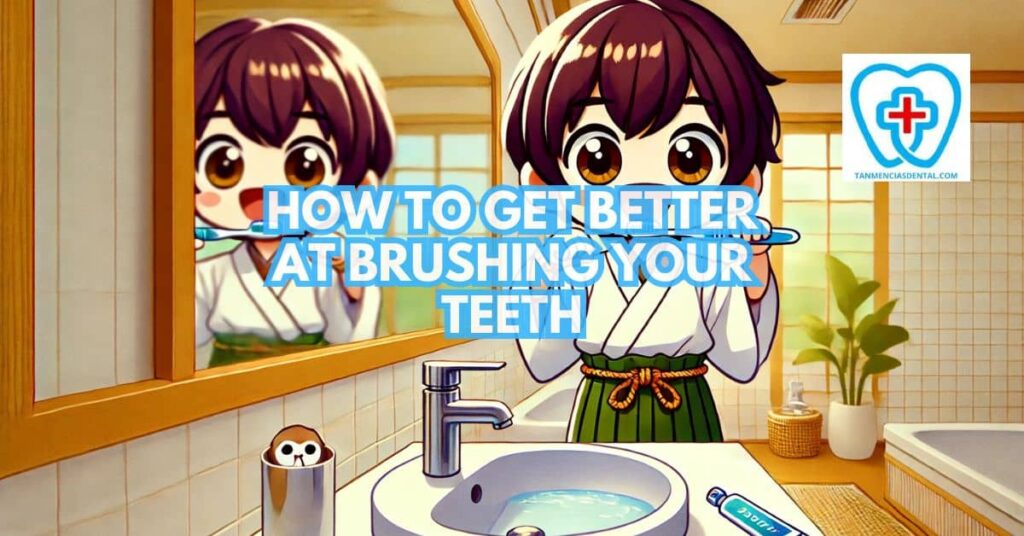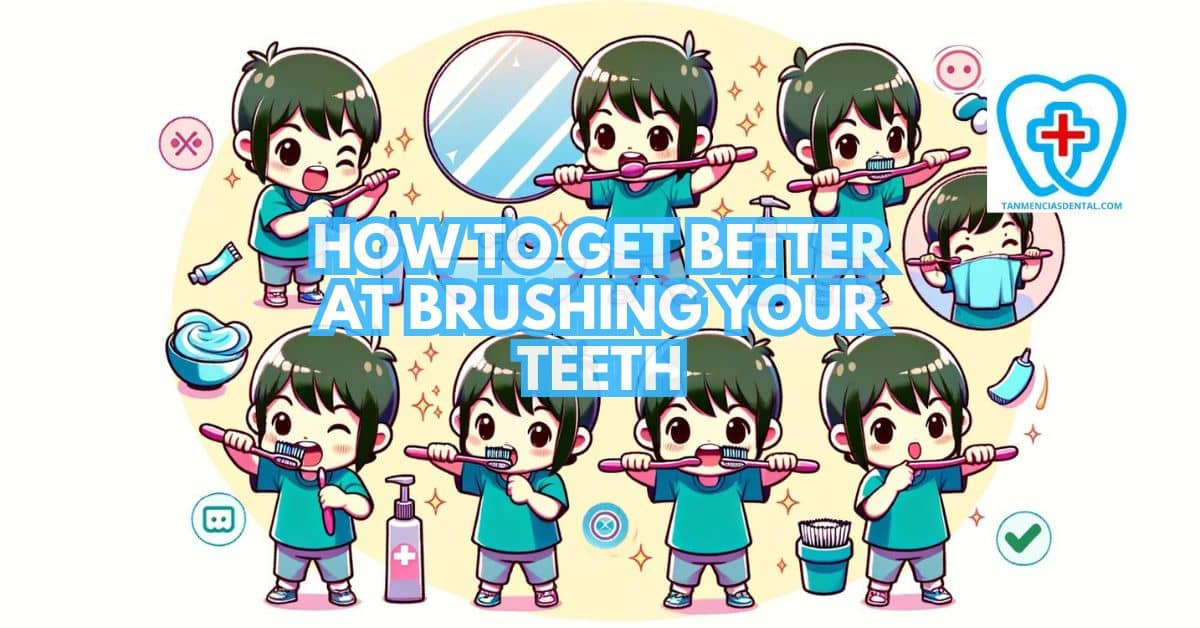Learning how to get better at brushing your teeth can improve your smile and overall health.
We’ll explain simple steps to help you clean your mouth well and prevent dental problems.
We cover the best tools, proper techniques, and helpful routines to keep your teeth strong and clean.
Each tip is designed to be easy to follow and easy to remember.
Follow these steps and see how small changes can lead to a brighter, healthier smile.
1. Selecting the Right Toothbrush: Your First Step to Better Dental Health
The journey to better toothbrushing begins with selecting the perfect toothbrush, as using the right one can improve oral care and prevent dental problems.
A toothbrush with soft bristles is recommended to avoid damaging your gums or enamel, which can lead to sensitivity and discomfort.
The size of the toothbrush head should allow easy access to all areas of your mouth, ensuring no spot is missed, including the back molars, where plaque often builds up.
Toothbrushes come in various shapes and designs, so choose one that feels comfortable in your hand and mouth, as this will make brushing easier and more effective.
Changing your toothbrush every three to four months, or sooner if the bristles are worn out, is crucial for maintaining its effectiveness and keeping bacteria from spreading.
A dental hygienist can provide personalized advice on the best toothbrush for your needs and demonstrate the proper way to brush for maximum cleanliness.
Brushing your teeth twice a day with a well-chosen toothbrush helps prevent cavities, freshens breath, and supports overall oral health.
🦷 Why Can’t You Whiten Teeth With Fillings Like Natural Teeth?
2. Crafting Your Ideal Brushing Routine: Timing Is Everything
Creating a toothbrushing routine that fits seamlessly into your daily life is crucial for maintaining dental health.
Brushing twice a day, in the morning and before bedtime, becomes a pillar of this routine.
Each brushing session should last two minutes, allowing sufficient time to thoroughly clean all areas of your mouth.
To make this habit stick, consider setting reminders on your phone or brushing at consistent times each day.
Incorporating toothbrushing into your daily routine not only promotes dental health but also sets the foundation for other healthy habits.
🦷 Can You Remove Wisdom Teeth While Wearing Braces?
3. Mastering the Technique: The Best Way to Brush Your Teeth
The effectiveness of your brushing largely depends on your technique.
To ensure proper brushing technique, hold your toothbrush at a 45-degree angle to your gums and use short, gentle strokes.
Clean the outer, inner, and chewing surfaces of all your teeth.
Pay special attention to hard-to-reach areas and the back of your mouth, where plaque tends to accumulate.
Brush for at least two minutes each time to ensure thorough cleaning.
Avoid aggressive brushing, as it can cause gum recession and wear down enamel.
If you have dental issues, consider cosmetic dentistry to make brushing more comfortable and effective.
Regularly review and adjust your technique to maintain optimal oral hygiene.
🦷 What to Know About Dental Implants Before and After Surgery
4. The Role of Toothpaste: Choosing the Right Ally
Selecting the right toothpaste is crucial to enhancing your toothbrushing effectiveness.
Fluoride toothpaste is widely recommended for its ability to strengthen tooth enamel and prevent decay.
Consider toothpaste that addresses specific dental needs, such as sensitivity or whitening, if applicable to you.
The flavor and texture of the toothpaste can also influence your willingness to brush, so choose one that you enjoy.
Remember, the best toothpaste is one that motivates you to stick to your brushing routine consistently.
🦷 Can You Get Veneers Without Shaving Your Teeth?

5. Flossing: The Essential Step in Your Brushing Routine
Flossing plays a critical role in your dental health routine by removing plaque and food particles from between your teeth that a brush can’t reach.
Make it a habit to floss at least once a day, ideally before brushing, to allow the fluoride from your toothpaste better access to these cleaned spaces.
Using the correct flossing technique—gently curving the floss around each tooth and sliding it beneath the gumline—can prevent irritation and damage.
If traditional floss is challenging to use, consider alternative tools like floss picks or water flossers.
Incorporating flossing into your routine complements your brushing and is essential for thorough dental care.
🦷 Mini Dental Implants vs. Regular Implants: Which Is Better for Your Smile?
6. Timing Your Brushing: Fitting Toothbrushing Into Your Daily Routine
Integrating toothbrushing into your daily schedule is essential for consistency and effectiveness.
Brushing your teeth after breakfast helps remove morning bacteria and any food particles, setting a clean tone for the day.
Evening brushing is critical for removing the day’s accumulation of plaque and preventing overnight bacterial growth.
Waiting 30 minutes after meals before brushing can protect your enamel from the effects of acidic foods.
Establishing specific times for brushing can help turn this vital activity into a second-nature habit.
🦷 How Teeth Whitening Can Damage Your Gums and What to Do About It
7. Using a Brushing Buddy: Make Toothbrushing More Fun
Incorporating a brushing buddy into your routine can make toothbrushing more enjoyable and ensure a thorough clean.
For children, a brushing buddy in the form of a parent, sibling, or even a favorite toy can turn brushing into a fun, shared activity.
Adults can benefit from a buddy system, too, perhaps by brushing at the same time as a partner or roommate.
Setting up a competitive or rewarding system for consistent brushing can motivate better habits.
Making toothbrushing a shared and enjoyable activity can significantly improve your commitment to dental health.
🦷 Can Retainers Straighten Teeth Without Braces?
8. Keeping Your Toothbrush Clean: Ensuring Effective Cleaning
A clean toothbrush is fundamental to achieving a clean mouth.
After each use, rinse your toothbrush thoroughly under running water to remove toothpaste and debris.
Store it in an upright position and allow it to air-dry until its next use, avoiding cases that can trap moisture and breed bacteria.
Replace your toothbrush every three to four months or sooner if the bristles become frayed, as worn-out bristles cannot clean teeth effectively.
Occasionally, soaking your toothbrush in antibacterial mouthwash can further ensure its cleanliness and efficacy.
🦷 Can Brushing Quotes Help You Enjoy Brushing Your Teeth?
9. Clean Your Tongue for a Fresher Smile
Cleaning your tongue helps remove bacteria and food particles.
It can lower the chance of bad breath and other mouth issues.
Using a tongue scraper or brushing gently with your toothbrush is effective.
This simple step supports your overall dental care routine.
Adding tongue cleaning to your habit can make your smile even healthier.
🦷 Can You Use Whitening Toothpaste With Braces? Here’s What You Need to Know
10. Talk to Your Dentist: Getting Professional Advice on How to Brush Better
Talking to your dentist is a crucial step in ensuring you’re equipped with the right knowledge to maintain healthy teeth and gums.
During regular visits, your dentist offers personalized advice to make brushing your teeth more effective, tailoring suggestions to fit your unique dental needs.
They can highlight areas in your mouth that are prone to plaque buildup and might be overlooked, helping you adjust your routine to target these spots better.
This guidance can extend to the selection of dental care products, such as recommending the best type of toothbrush, toothpaste, and dental floss to use, ensuring you’re not just cleaning but caring for your mouth.
Regular dental checkups serve as a preventive measure, allowing for the early detection of cavities and other potential issues before they escalate into more significant problems.
Your dentist’s expertise is invaluable in creating a dental care routine that helps prevent the formation of cavities, promoting a lifetime of healthy teeth and gums.
View your dentist not just as a healthcare provider but as a dedicated partner in the journey toward achieving and maintaining optimal dental health.
🦷 Can Veneers Get Cavities? What Your Dentist Says
11. Overcoming Challenges: Solutions for Common Brushing Mistakes
Even with the best intentions, common brushing mistakes can undermine your dental health efforts.
If you’re brushing too hard, switch to a toothbrush with softer bristles and consciously ease the pressure.
For those not brushing long enough, using a timer or an electric toothbrush with a built-in timer can ensure you reach the recommended two minutes.
Ensure you’re reaching all areas of your mouth, including the back molars and along the gum line, to avoid plaque buildup.
Regularly reassessing your habits and being open to adjustments can help overcome these challenges and improve your oral health.
🦷 Can You Whiten Bonded Teeth at Home Effectively?
12. Why Do I Struggle To Brush My Teeth?
Struggling to brush your teeth can be due to several reasons.
You might find it boring or unpleasant, making it easy to skip.
Sometimes, people forget because they have busy schedules.
Dental issues, like sensitive gums, can also make brushing uncomfortable.
Finally, not knowing the right technique can make the process seem less effective and discouraging.
🦷 Tan-Mencias Dental Services in Marikina
👨⚕️ Conclusion
Improving the way you brush your teeth is a continuous journey that requires dedication, awareness, and the willingness to adapt.
By selecting the right tools, mastering your technique, and integrating toothbrushing into your daily routine, you can significantly enhance your dental health.
Remember, small adjustments can lead to significant benefits, including a healthier mouth and a brighter smile.
Stay committed to your oral hygiene practices, seek advice from dental professionals, and welcome improvements to your routine.
Your teeth and your overall health will thank you for it.
😊 Self-Promotion
Discover the path to a brighter smile at Tan-Mencias Dental Clinic, nestled in the heart of Parang, Marikina City!
Our friendly team is dedicated to providing you with personalized, top-quality dental care in a warm and welcoming environment.
Whether you have questions or you’re ready to book your next appointment, reaching us is easy: call us at 9171451074, leave a message on our Facebook page, or contact us via our website’s contact page.
We’re here to ensure your dental health journey is as comfortable and convenient as possible.
Join the Tan-Mencias Dental Clinic family today and experience the difference a caring dental team can make in your life!

